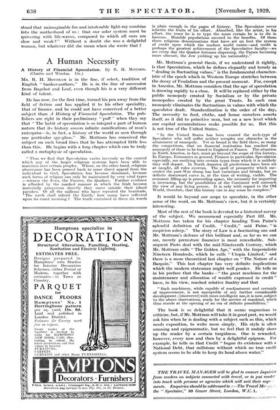Lady Welby's Correspondents
Echoes of Larger Life. Edited by Mrs. Henry Cuat. (Jonathan Cape. 12s. 6d.) LADY WELBY had the art of intimacy in a very high degree. She cultivated it by means of the pen. The aim of her life was the .reconciling of science and religion—no less. The charm, however, of this -selection from her correspondence does not depend upon this aim, although it is not lost sight of in any of the letters written or received. She had a marvel- lous power of extracting the secrets of the soul. The theologians, men of science, men and, women of letters, naturalists. and. supernaturalists who flourished around her in the 'eighties all opened their hearts at her touch. Not all of them were impressed by her obscure philosophical theories, but of thesetheories we see little in the letters, most of which are' answers. Almost all of them give a real insight into the inner life of -their authors.
-She thought -that if'the -intellectuals of her day would but
listen to- her, their faith would be treniendously enforced from -a new side. They did listen, and they poured out their own doubts and conclusions more or less irrespective of hers— though not of her. " It is useless to ask Why I have Written to you as I have," writes Dr. George Kingsley, a naturalist of some distinction, though overshadowed by his brilliant brothers, Charles and Henry. I cannot live for ever with my head in my shell: It is so very pleasant to put it forth into a ray of warm. sunshine." Somehow or other he is moved to write absolutely freely of himself, and the readers see a personality more charming, because more humble, than the magnetic parson and saner than-the erratic novelist. But far greater men than he wrote almost as freely. Huxley wrote of death. I am not sure,- he says, that a living being is comparable to a machine running down. On this side of the question the whirlpool affords a better parallel than the watch."
Bishop Westeott and R. H. Hutton discuss with her the signs of the times. Hutton confesses himself utterly discouraged and cast down," but not less with himself than with the world. Like her he is alarmed by "the general trend of things," but he will not go as far as she goes when she laments the something " rotten ". in the Church. You say there is something rotten in the Church," . he writes. "Well, where is it ? in what other time, if any, has there been so much Christlike effort and even passion, in the good works of the Church, as there is now?" She replies pointing out "the general estrangement, not of the cynic and the scoffer, 'not of the selfish and of the easy, but of many of the most honest and open and clear-minded of our day." One wonders if she had Voysey, the "anti-Christian theist," in mind when she wrote. The latter's letters form a very inter- esting part of the book, but make an unpleasant impression on the reader. There is as much unconscious vulgarity as profanity in his assertion that for his part he thinks his correspondent's character nearer the ideal than that of the founder of Christianity. Dr. Martineau, the great Unitarian theologian, who should, of course, not be mentioned in the same day with Voysey, is ponderous in his letters but intimately interesting. Matthew Arnold writes kindly but from his head only'; Professor Tyndall, on the other hand, from his heart only. "One thing is pleasant to observe, that your philosophy does not invade nor weaken in any way the, loving portion of your nature. So long as this is, kept fresh and fragrant, and so long as you embrace us within its borders, I care little what philosophy you may entertain." Truly a model of epistolatory tact !. The reader who, near the end of the volume, comes across the following difficult passage in one of Lady Welby's own letters will certainly understand his attitude. "The great question is : Are we merely planetary or potentially solar-cosmic ? Do we under.
Stand that unimaginable fire and intolerable light-ray combine into the motherhood of us : that our solar system must be quivering with life-waves, compared to which all ours are slow and weak ? " Without a doubt she was a delightful woman, but whatever did she mean when she wrote that ?









































 Previous page
Previous page